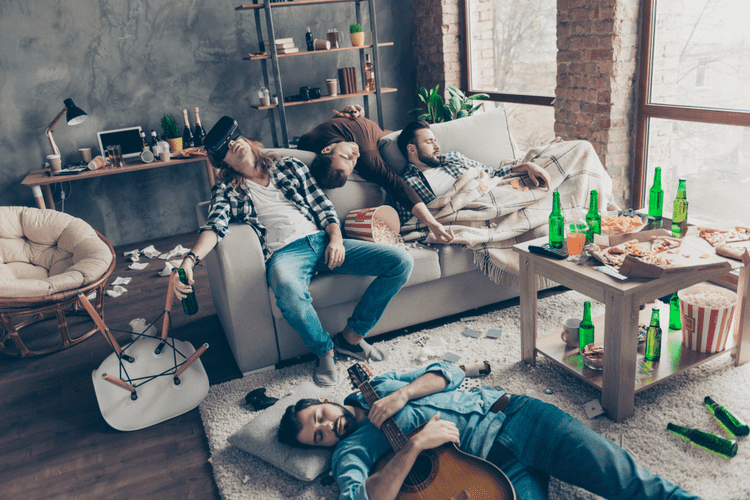Contents
GI pain/discomfort symptoms in the daily diary included abdominal pain, abdominal bloating, intestinal gas, nausea, stomach pain, heartburn, and indigestion. GI symptoms related to stool characteristics were diarrhea and constipation. In addition, number of stools and their consistency was recorded. Although we need more research on this topic, some studies and anecdotal evidence tell us that about one-third of people with IBS feel alcohol is a trigger for their symptoms. Alcohol is a “gut irritant”, which can either slow or speed up motility and trigger constipation or diarrhea .
Trauma impacts our mental health negatively and alcohol can do the same. Alcohol weakens the immune system and lowers the number of nutrients in the small intestine. If the lining of the small intestine is damaged, celiac disease may occur. If you’re wondering what the best drink for IBS is, Monash University has actually looked into the question and come up with high FODMAP and Low FODMAP alcohol lists.
What patients know about irritable bowel syndrome and what they would like to know. National Survey on Patient Educational Needs in IBS and development and validation of the Patient Educational Needs Questionnaire . Assess your own relationship between alcohol intake and symptom development as your tolerance will be unique to you. Take our free quiz to discover if Nerva’s gut-directed hypnotherapy program can work for you. Because there is little information as to the interaction of IBS and alcohol, the answer as to whether or not you should be drinking if you have IBS seems to be that it is a fairly personal decision. If you have fructose malabsorption, you will want to avoid drinks containing rum.
Preventing festive flare-ups of IBS
Food slows down the release of alcohol from the stomach and reduces the potential for digestive symptoms. If you can’t eat a proper meal, try to have at least an appetizer or a snack to avoid drinking on a completely empty stomach. Ideally, you want to test how alcohol affects you by reintroducing it during a time when you feel your best in regards to your IBS and notice whether it makes your gut symptoms worse. If you are in the one-third of people who are triggered by alcohol, it might be best to avoid it and go for a mocktail or sparkling water mixed with a low FODMAP juice. With the holidays approaching, you might be wondering not just about how all those holiday meals and desserts may be affecting your gut but whether it’s ok to celebrate with alcoholic drinks. Even if you consume a low FODMAP alcohol, mixers in alcoholic drinks can often cause digestive problems too. Beverages commonly used in mixed drinks, such as fruit juices and soda tend to be high in fructose, high fructose corn syrup, and sugar alcohols, all of which are high FODMAP that can cause digestive troubles.

There doesn’t appear to be a definite answer to the specific effects alcohol has on IBS symptoms. The technical storage or access is required to create user profiles to send advertising, or to track the user on a website or across several websites for similar marketing purposes. The technical storage or access that is used exclusively for anonymous statistical purposes. Without a subpoena, voluntary compliance on the part of your Internet Service Provider, or additional records from a third party, information stored or retrieved for this purpose alone cannot usually be used to identify you. Alcoholrehab.com needs to review the security of your connection before proceeding.
Calm your IBS in 6 weeks
The more alcohol you drink, the more you raise your risk for detrimental effects on your health. Staying hydrated might help dilute the alcohol, making it less irritating. A 2013 study suggests the reason for this inconsistency may be that alcohol’s effects on IBS simply differ according to the person’s pattern of alcohol use. Although different triggers affect different people, a range of factors can cause symptoms, including alcohol. First, alcohol goes to the stomach and them the small intestine, where it is quickly absorbed into the blood stream.
- Let’s take a look at how alcohol affects IBS and what you can do to minimize flare-ups if you choose to have a drink or two.
- In the literature, it has thus far been unclear whether alcohol intake affects GI symptoms in IBS patients.1 Several reasons may exist for the lack of consistency in the published research.
- This way, they can determine which foods are irritants and remove them from their diet.
The Cox proportional hazards regression model was used for measuring the risk of IBS in the AUD patients compared with the non-AUD patients and presented using adjusted hazard ratios and 95% CIs. We presented the aHR of IBS between AUD and non-AUD groups stratified by sex (women/men), age, and different comorbidity types (yes/no) by Cox proportional hazards regression model too. The mean of age was chosen as an age stratified analysis cut-point and then presented the relative risk of IBS between both groups in 45 years old. We further examined the association between the severity of AUD and IBS according to severity, which was defined as the total length of hospital stay caused by AUD in the follow-up period to the length of follow-up period.
Get updated on FODMAP news
Alcohol is always a trigger for gastrointestinal upset, and pairing alcohol and IBS together can have some painful outcomes. Irritable bowel syndrome can be a lifelong condition with varying degrees of symptoms that interfere with a person’s work, travel, and social activities. Someone with IBS has to be very careful about the foods and drinks they consume. Food choices can trigger IBS symptoms and create gastrointestinal distress and sometimes debilitation. Each GI symptom was rated on a scale from 0 to 4, with 0 , 1 , 2 , 3 , and 4 .
Healthline has strict sourcing guidelines and relies on peer-reviewed studies, academic research institutions, and medical associations. You can learn more about how we ensure our content is accurate and current by reading our editorial policy. Also take note what triggers your IBS symptoms, and work to manage those triggers in the future. Researchers also noted alcohol decreases absorption and movement of carbohydrates, like FODMAPs. This can increase their side effects and thus IBS symptoms, such as bloating, gas, and stomach pain. Alcohol affects the working of your digestive system in many ways.
If these doctors or hospitals make wrong diagnoses or coding, they will be punished with a lot of penalties. Therefore, the diagnoses of the diseases based on ICD-9 codes in this study were highly reliable. Finally, data on alcohol consumption frequency per week and IBS subtypes were not available. Also, participants were asked best sober house living in boston, massachusetts to report feelings of anxiety, depression, desire to be alone, tension, and hopelessness, rating their response on a scale from 0 to 4 . Events, celebrations, holidays, and other spaces take up a lot of room with alcohol. Even though it can have detrimental effects for people’s health, they persist on drinking a lot.

If you do choose to have more than one drink, slow down your intake. This will give your digestive system time to process the alcohol, potentially reducing next-day symptoms. A 2013 study in the American Journal of Gastroenterology compared drinking habits and next-day symptoms in 166 women, ages 18 to 48, who were diagnosed with IBS.
Can I drink alcohol if I have IBS?
First, our daily diaries do not provide a temporal sequence between alcohol, caffeine, cigarettes and GI symptoms within the day. However, we attempted to overcome this issue by investigating the role of lifestyle factors on next day’s GI symptoms. Because symptoms related to alcohol are often observed the following day, this approach works well for investigations regarding alcohol. In addition, while the study participants were taught how to complete the alcohol section of the daily diary according to wine, beer, and liquor consumption, no information was collected on the type of alcohol within the daily diary. Overall, a primary strength of our study is our prospective data on daily cigarette, alcohol and caffeine intake, as well as prospective ascertainment of GI symptoms. With the exception of cigarettes and symptoms of constipation, our data suggest that caffeine and cigarettes play at most a modest role in GI symptoms among women with IBS.
This can also increase its side effects and may trigger IBS symptoms, such as bloating, gas, pain, and irritation. Alcohol’s interaction with Irritable Bowel Syndrome seems to be highly personal, varying from individual to individual. We know for sure that alcoholic beverages have several effects on the digestive system – from the esophagus down to the intestines. Staudacher HM, Whelan K, Irving PM, Lomer MC. Comparison of symptom response following advice for a diet low in fermentable carbohydrates versus standard dietary advice in patients with irritable bowel syndrome. Characteristics of our study population are presented separately for IBS patients and controls in Table 1. There were no differences in demographic characteristics between IBS patients and controls.
Statistical Analysis
She has written multiple books focused on living with irritable bowel syndrome. If you notice an increase in your IBS symptoms when you drink, consider abstaining from alcohol. Monsbakken KW, Vandvik PO, Farup PG. Perceived food intolerance in subjects with irritable bowel syndrome– etiology, prevalence and consequences. alcohol, headaches and hangovers Halder SL, Locke GR, 3rd, Schleck CD, Zinsmeister AR, Talley NJ. Influence of alcohol consumption on IBS and dyspepsia. If you are suffering from IBS and want to find relief from your gut symptoms and enjoy food again, click on the button below to schedule your obligation-free discovery call with me.
Associations between alcohol intake and GI symptoms were stronger for women with IBS-diarrhea than for IBS-constipation or IBS-mixed. Also known as ethyl alcohol or ethanol, drinking alcohol is a short chain of two carbons with an alcohol group on one end. When ingested, ethanol acts mainly on brain cells with certain receptors called GABAA receptors; this interaction causes the enjoyable experience one gets when drinking alcoholic beverages. Some studies have shown that alcohol is closely tied to the Low FODMAP diet, since it decreases the absorption and movement of carbohydrates, like FODMAPs .
The IBS patients went on to participate in a randomized trial of a comprehensive self-management intervention.8 This study was approved by the Institutional Review Board at the University of Washington. Our findings indicate that IBS symptoms differ according to the pattern of alcohol intake among IBS patients, suggesting that the pattern of drinking may in part explain the inconsistent findings between what should you do after a relapse symptoms. We investigated prospective associations between daily patterns of alcohol intake and next day’s GI symptoms using daily diaries. The study also observed that drinking and next-day symptoms were more likely in women who have IBS-D (diarrhea-predominant) than those who had IBS-C (constipation-predominant) or IBS-Mixed. This is not too surprising, as even in people without IBS alcohol is known to speed up the rate of digestion, causing diarrhea.